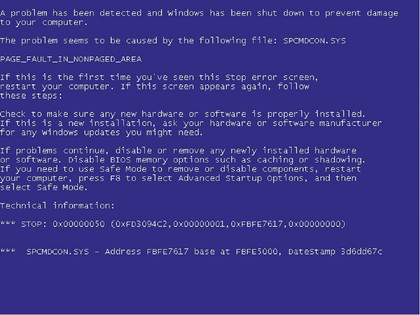Sign up for breaking news, reviews, opinion, top tech deals, and more.
You are now subscribed
Your newsletter sign-up was successful
Whatever else you want from an operating system, reliability is essential. Defining exactly what that means can be tricky, though, as there are many different factors to consider. A reliable operating system has to be well understood by developers, for instance, and here Windows XP is in its element. It's mature, it's built around classic Windows NT kernel technology and there are many development tools around to help produce quality applications.
Reliability also requires weak points to be addressed, however – and Windows Vista does implement some important new ideas. Windows XP, for example, allocates system memory for device drivers, file cache, kernel stacks and other requirements at boot time. If, say, it turns out that your drivers need more RAM later, then that's just tough: they'll have to do without, usually with catastrophic results. Vista can manage its system memory dynamically, freeing up RAM in one area when more is required elsewhere, reducing the chance of driver-related crashes.

FEELING BLUE: When crashes happen, Windows Vista does a good job of helping you track down exactly what caused them
Of course, a really buggy application is going to fall over at some point anyway, so a reliable operating system must also provide ways to track errors, diagnose problems and find out what's going on. It's here that Vista really wins out over XP. Crash data is saved, allowing you to view your system stability over time. A greatly improved Event Viewer is far more likely to identify the cause of your problems, and Windows can regularly check for new fixes that might prevent particular crashes.
Windows XP wins in terms of stability and maturity, then. But the majority of problems are caused by bugs in drivers and applications, not core Windows code, and so Vista's superior error handling and reporting is extremely important. When you also factor in a selection of low-level changes, such as improved memory management and the ability to recover from failures like broken services or corrupt system files, then Vista (despite all its quirks) just scrapes into first place for this category. Our award is for a strictly limited time, though, as we'd anticipate Windows 7 moving swiftly into the top spot once its understandable teething problems are ironed out.
Scores
XP: 3 / 5
Sign up for breaking news, reviews, opinion, top tech deals, and more.
Vista: 3.5 / 5
Windows 7: 3 / 5
Current page: Windows 7 vs Vista vs XP: Reliability
Prev Page Windows 7 vs Vista vs XP: Entertainment Next Page Windows 7 vs Vista vs XP: Conclusion and benchmarks